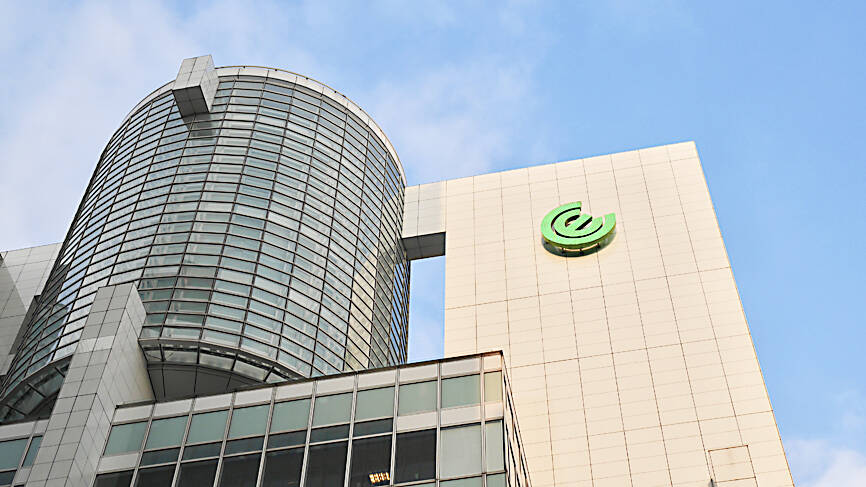Compal Electronics Inc (仁寶), the world’s second-biggest contract notebook computer maker, yesterday said that its net profit surged 50 percent quarter-on-quarter to NT$2.09 billion (US$65.73 million) last quarter, benefiting from a rebound in PC demand and rush orders for Chromebooks ahead of license fee hikes by Google’s parent company, Alphabet Inc.
That compared with first-quarter net profit of NT$1.39 billion. On an annual basis, net profit rose 4 percent from NT$2.02 billion.
Earnings per share rose to NT$0.48 last quarter from NT$0.32 in the first quarter and NT$0.46 in the second quarter last year.

Photo: Fang Wei-chieh, Taipei Times
Operating margin improved to 1.13 percent last quarter from 1.08 percent in the first quarter and 0.74 percent in the second quarter last year.
“We have received numerous rush orders during the second quarter,” Compal president Martin Wong (翁宗斌) told an online investors’ conference. “PC channel inventory has returned to normal levels.“
“We see recovery looming in the third and fourth quarters, aided by improving inflationary pressure and easing interest rate hikes by the US,” Wong said.
However, as customers have turned conservative about placing orders, Compal said there was caution about the outlook for the third and fourth quarters.
For this quarter, shipments of notebook computers should grow at a single-digit percentage from 8.7 million units last quarter due to a higher comparison base last quarter, Wong said.
For the whole year, notebook computer shipments would shrink between 10 and 15 percent compared with last year, he said.
However, Compal is optimistic about next year’s business, expecting the PC industry to embrace new replacement demand.
After holding back on spending for the past three years during the COVID-19 pandemic, corporations would be more willing to spend on PC and information system upgrades given an improving world economy, Wong said.
“The industry’s winter should be approaching its end this year,” he said. “We are more optimistic about next year and the year after.”
“Besides, the introduction of artificial intelligence [AI]-enabled notebook computers will help spur some demand,” he added.
Investors yesterday focused on Compal’s diversification to server business.
Compal is rapidly expanding into servers following in the steps of local rivals.
It expects revenue contribution from servers next year would rise from 2 or 3 percent this year.
“We have made some progress by gaining more customers from Europe this year,” Wong said. “Next year, we are expanding our reach to the US market.”
On top of that, shipments of AI-enabled servers are to increase significantly to make up 20 to 25 percent of the company’s total server shipments next year, from 8 percent this year, the firm said.
Compal is also broadening its business scope to include healthcare devices and automotive components.
It is targeting a boost in revenue contribution from the new business areas to 10 percent within three years from 5 percent this year, it said.

Taiwan Semiconductor Manufacturing Co (TSMC, 台積電) yesterday said that its investment plan in Arizona is going according to schedule, following a local media report claiming that the company is planning to break ground on its third wafer fab in the US in June. In a statement, TSMC said it does not comment on market speculation, but that its investments in Arizona are proceeding well. TSMC is investing more than US$65 billion in Arizona to build three advanced wafer fabs. The first one has started production using the 4-nanometer (nm) process, while the second one would start mass production using the

When an apartment comes up for rent in Germany’s big cities, hundreds of prospective tenants often queue down the street to view it, but the acute shortage of affordable housing is getting scant attention ahead of today’s snap general election. “Housing is one of the main problems for people, but nobody talks about it, nobody takes it seriously,” said Andreas Ibel, president of Build Europe, an association representing housing developers. Migration and the sluggish economy top the list of voters’ concerns, but analysts say housing policy fails to break through as returns on investment take time to register, making the

‘SILVER LINING’: Although the news caused TSMC to fall on the local market, an analyst said that as tariffs are not set to go into effect until April, there is still time for negotiations US President Donald Trump on Tuesday said that he would likely impose tariffs on semiconductor, automobile and pharmaceutical imports of about 25 percent, with an announcement coming as soon as April 2 in a move that would represent a dramatic widening of the US leader’s trade war. “I probably will tell you that on April 2, but it’ll be in the neighborhood of 25 percent,” Trump told reporters at his Mar-a-Lago club when asked about his plan for auto tariffs. Asked about similar levies on pharmaceutical drugs and semiconductors, the president said that “it’ll be 25 percent and higher, and it’ll

CHIP BOOM: Revenue for the semiconductor industry is set to reach US$1 trillion by 2032, opening up opportunities for the chip pacakging and testing company, it said ASE Technology Holding Co (日月光投控), the world’s largest provider of outsourced semiconductor assembly and test (OSAT) services, yesterday launched a new advanced manufacturing facility in Penang, Malaysia, aiming to meet growing demand for emerging technologies such as generative artificial intelligence (AI) applications. The US$300 million facility is a critical step in expanding ASE’s global footprint, offering an alternative for customers from the US, Europe, Japan, South Korea and China to assemble and test chips outside of Taiwan amid efforts to diversify supply chains. The plant, the company’s fifth in Malaysia, is part of a strategic expansion plan that would more than triple